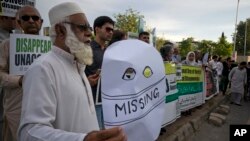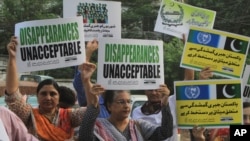A Pakistani social media and peace activist is feared to have been abducted from the eastern city of Lahore.
Raza Khan, 40, is said to have gone missing after arranging an open discussion Saturday focusing on extremism and blasphemy in relation to the recent Islamabad sit-in by a radical Islamist group, according to his brother Hamid Nasir, who spoke with VOA's Urdu service.
"Raza has been missing since Saturday from Lahore, and both of his cellphones are continuously switched off," Nasir said. "We have filed a complaint with the police. The police are cooperating with us."
During the Saturday discussion, Khan severely criticized the government for allowing thousands of hard-liners to gather, protest and shut down the capital for more than two weeks, according to local media reports.
The demonstrators, belonging to a radical religious group, demanded the resignation of Pakistan's law minister after accusing him of committing blasphemy over an omitted reference in a parliamentary bill to Islam's Prophet Muhammad.
The sit-in turned violent when security forces tried to disperse the protesters in Islamabad, which led to a series of demonstrations in other cities.
Eventually, the government surrendered to the religious group's demands after Pakistan's army helped the government and the protesters reach an agreement.
Despite raising his voice against extremist ideologies, minority rights and blasphemy laws in Pakistan, Khan also was a proponent of friendship between Pakistan and India, and he was an active member of a group called Aghaz-e-Dosti (Beginning of Friendship), which seeks to promote peace between the archrivals.
Nearly 1,500 cases
Khan's disappearance comes at a time when, according to statistics submitted recently by the Commission of Inquiry on Enforced Disappearances to the Apex court, about 1,498 cases of enforced disappearances remain pending with the government.
Mehdi Hasan, a prominent human rights activist based in Lahore, condemned Khan's abduction, and said it was evident who was behind such heinous acts in a country like Pakistan.
"When you are a progressive activist, and criticize the military and the government, you have to pay a price.The basic violations of human rights are committed by the government's agencies in this country, who must have been behind Khan's abduction," Hasan told VOA.
"Until the courts charge somebody with harmful activities toward the state, how can you arrest or abduct someone like this?" Hasan asked. Such forced disappearances, he said, demonstrate "that there is no rule of law. I believe the mainstream political parties need to focus on the issue and come up with a solution."
Civil rights activists in Pakistan fear Khan's abduction is another effort to silence the growing dissent in the country. They noted the mysterious disappearance and reappearance earlier this year of a number of liberal social media activists.
The activists were blogging about political awareness and raised their voices against human rights violations, religious intolerance and extremism in Pakistan. They were blamed for committing blasphemy during the time they went missing, and they had to take refuge in foreign countries after being set free.
Two bloggers, Aasim Saeed and Waqas Goraya, later blamed Pakistan's intelligence agency for their forced disappearance and interrogation.
Pakistan's armed forces have denied involvement in these disappearances.
VOA Urdu service's Muhammad Ishtiaq contributed to this report.






